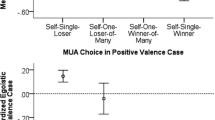Abstract
The study, conducted in Malaysia, examined the role of recipient–allocator relationship in perceived choice of resource allocation norms (equity, equality, and need) on two types of resources (money and favour) and the degree to which they were considered fair. Subjects responded to vignettes that described a resource to be allocated by an allocator between a needy and a meritorious employee. Recipients relationship status in the vignettes indicated that one of the two was the brother of the allocator who was either meritorious or needy. In the control group, no relationship characteristic of the recipient was stated. Results indicated that equality was the most fair and preferred norm of justice. No significant difference was obtained among the perceived norm and fairness in all but one situation (distribution of loan). The results are discussed in relation to the subjects’ cognitive strategy and collectivistic values.

Similar content being viewed by others
References
Abdullah, A. (1996). Going glocal: Cultural dimensions in Malaysian management. Kuala Lumpur: Malaysian Institute of Management.
Aruna, A., Jain, S., Choudhary, A. K., Ranjan, R., & Krishnan, L. (1994). Justice rule preference in India: Cultural or situation effect? Psychological Studies, 39(1), 8–17.
Benton, A. A. (1971). Productivity, distribution, justice, and bargaining among children. Journal of Personality and Social Psychology, 18(1), 68–78.
Berman, J. J., Murphy-Berman, V. A., & Singh, P. (1985). Cross-cultural similarities and differences in perceptions of fairness. Journal of Cross-Cultural Psychology, 16(1), 55–67. https://doi.org/10.1177/00220022002185016001005.
Chen, C. C. (1995). New trends in reward allocation preferences: A Sino-U.S. comparison. Academy of Management Journal, 38(2), 408–428. https://doi.org/10.2307/256686.
Deutsch, M. (1975). Equity, equality, and need: What determines which value will be used as the basis of distributive justice? Journal of Social Issues, 31(3), 137–149.
Fischer, R., & Smith, P. B. (2003). Reward allocation and culture: A meta-analysis. Journal of Cross Cultural Psychology, 34(3), 251–268.
Giacobbe-Miller, J. K., Miller, D. J., & Victorov, V. I. (1998). A comparison of Russian and U.S. pay allocation decisions, distributive justice judgements, and productivity under different payment conditions. Personnel Psychology, 51(1), 137–163.
Greenberg, J., & Cohen, R. L. (1982). Equity and justice in social behaviour. New York: Academic Press.
Hassan, A., & Ahmed, K. (2001). Malaysian management practices: An empirical study. Kuala Lumpur: Leeds Publications.
Hofstede, G. (1980). Culture’s consequences. Beverly Hills, CA: Sage.
Hofstede, G. (2001). Culture’s consequences: Comparing values, behaviours, institutions, and organizations across nations. Thousand Oaks, CA: Sage.
Homans, G. C. (1961). Social behaviour: Its elementary forms. London: Routledge & Kegan Paul.
Hundley, G., & Kim, J. (1997). National culture and the factors affecting perceptions of pay fairness in Korea and the United States. International Journal of Organizational Analysis, 5(4), 325–341.
Krishnan, L. (1998). Allocator/recipient role and resource as determinants of allocation rule preference. Psychological Studies, 43(1–2), 2129.
Krishnan, L. (2000). Resource, relationship, and scarcity in reward allocation in India. Psychologia, 43(4), 275–285.
Krishnan, L. (2001). Justice perception and allocation rule preferences: Does social disadvantage matter? Psychology and Developing Societies, 13(2), 193–219.
Krishnan, L., Varma, P., & Pandey, V. (2009). Reward and punishment allocation in the Indian culture. Psychology and Developing Societies, 21(1), 79–131.
Lerner, M. J. (1974). The justice motive: ‘‘Equity’’ and ‘‘parity’’ among children. Journal of Personality and Social Psychology, 29(4), 1–52.
Lerner, M. J., Miller, D. T., & Holmes, J. G. (1976). Meritorious and emergence of forms of justice. In L. Berkowitz & E. Walster (Eds.), Advances in experimental social psychology (Vol. 9, pp. 133–162). New York: Academic Press.
Leung, K., & Bond, M. H. (1982). How Chinese and Americans reward task-related contributions. Psychologia, 25(1), 32–39.
Leventhal, G. S. (1976). Fairness in social relationships. In J. W. Thibaut, J. T. Spence, & R. C. Carson (Eds.), Social exchange: Advances in theory and research (pp. 27–55). New York: Plenum Press.
Lin, Y. H. W., Insko, C. A., & Rusbult, C. L. (1991). Rational selective exploitation among Americans and Chinese: General similarity with one surprise. Journal of Applied Social Psychology, 21(14), 1169–1206.
Mahler, I., Greenberg, L., & Hayashi, L. (1981). A comparative study of rules of allocation: Japanese versus American. Psychologia, 24(1), 1–8.
Marin, G. (1981). Perceiving justice across cultures: Equity versus equality in Columbia and United States. International Journal of Psychology, 16(13), 153–159.
Mikula, G., & Schwinger, T. (1978). Intermember relations and reward allocations: Theoretical considerations of affects. In H. Brondstaller, J. H. Davis, & G. Schuler (Eds.), Dynamic of group decisions (pp. 229–250). Beverly Hill, CA: Sage.
Murphy-Berman, V., Berman, J. J., Singh, P., Pachauri, A., & Kumar, P. (1984). Factors affecting allocation to needy and meritorious recipients: A cross-cultural comparison. Journal of Personality and Social Psychology, 46(6), 1267–1272.
Otto, K., Baumert, A., & Bobocel, S. R. (2011). Cross-cultural preferences for distributive justice principles: Resource type and uncertainty management. Social Justice Research, 24(3), 255–277. https://doi.org/10.1007/s11211-011-0135-6.
Pandey, J., & Singh, P. (1989). Reward allocation as a function of resource availability, recipients’ needs, and performance. Genetic, Social, and General Psychology Monographs, 115(4), 467–481.
Pandey, J., & Singh, P. (1997). Allocation criterion as a function of situational factors and caste. Basic and Applied Social Psychology, 19(1), 121–132.
Thibaut, N., & Kelley, H. (1959). The social psychology of groups. New York: Wiley.
Wu, T.-F., Cross, S. E., Wu, C.-W., Cho, W., & Tey, S.-H. (2016). Choosing your mother or spouse: Close relationship dilemmas in Taiwan and the United States. Journal of Cross-Cultural Psychology, 47(4), 558–580.
Author information
Authors and Affiliations
Corresponding author
Additional information
Publisher's Note
Springer Nature remains neutral with regard to jurisdictional claims in published maps and institutional affiliations.
Rights and permissions
About this article
Cite this article
Hassan, A., Ahmed, M. Fairness in Allocation Decisions: Does Type of Resource and Relationship Matter?. Psychol Stud 64, 103–109 (2019). https://doi.org/10.1007/s12646-019-00480-8
Received:
Accepted:
Published:
Issue Date:
DOI: https://doi.org/10.1007/s12646-019-00480-8




